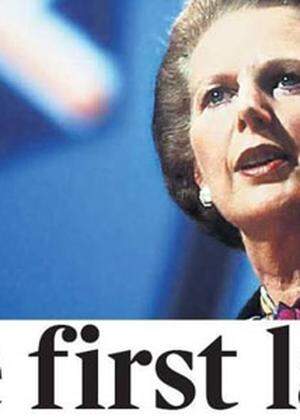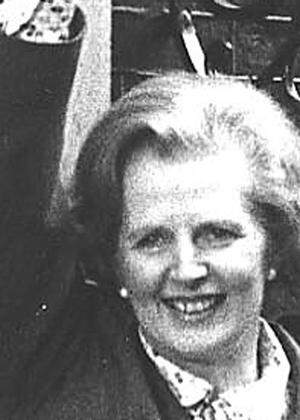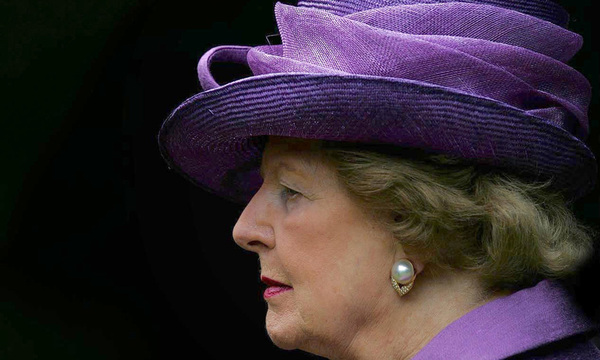Margaret Thatcher saved Britain's economy and had she been less Euro-sceptic perhaps she could have saved Europe from the Euro. But the lack of any account of the social blinded her to the fate of her people. In the end she created a world in which too few won and too many lost.
The newspapers of the world have been covered with photographs of Margaret Thatcher who passed away last Monday, 8th April. In a way this itself is testimony to her achievements and her impact. Leaving aside Winston Churchill it is hard to think, not just of a British Prime Minister more global in influence and importance, but of any politician anywhere of having greater significance than Mrs Thatcher over the last 50 years.
But in what does Mrs Thatcher's rank and reputation reside? Overall she has such international import not because of deeds or works but because she personified an ideology and exemplified an approach that attempted to become universal and to all intents and purposes succeeded in doing so. She led through ideas and insofar as she came to embody them they gave her a longevity and a reach beyond the normal span of a successful political life. These ideas, termed by academics as neo-liberal, were so colonised by their passage through Mrs Thatcher that ever after they have become known as Thatcherism. Mrs Thatcher was always more influential and important in the transmission of neo-liberalism than her fellow traveller Ronald Regan. As US President, Regan understood the new approach intuitively but Mrs Thatcher grasped them conceptually and repeated them as such, and it is concepts not intuitions that cross time zones, languages and nations.
So what was Thatcherism? At base an extreme almost religious individualism, crafted with and coupled to a critique of the state and state collectivism (lifted almost in its entirely from Friedrich von Hayek the famous Austrian economist), and an unabashed and wholly uncritical adherence to free market liberalism and the privatisation programmes it advocated as its proxy. The fusion of these three elements constitutes to my mind the on-going global legacy of Thatcherism. Domestically all of this was allied to a rigorous British nationalism, a distaste even contempt for European social democracy, a passionate loathing of communism, trade unionism and any form of institution captured in her mind by socialists, local government being the best example. If this was not enough she demonstrated an extraordinary reservoir of human will and a preternatural determination to carry out her vision and her policies.
Starting from her achievements, there is little doubt that when capitalism shifted and the whole post-war system in the West collapsed in the 1970's, Mrs Thatcher and her colleagues such as Keith Joseph were among the first politicians in the developed world to recognise and respond. Thatcher elected as the first female leader of the Conservative party in 1975 and the first woman to be British Prime Minister in 1979 had an enormous task facing her. Britain since the early 1960's had been a basket case, with falling productivity, increasingly rampant inflation, a wage price spiral and unprecedented trade union militancy. The UK's growth rate trailed far behind that of its European neighbours, and many in Britain feared a relegation of the country to third class status. It is an enduring and remarkable feat that by the end of her premiership Britain had recovered its place at the world's top table - a leading power in many aspects and degrees and without doubt then at least, the most influential and important European country in the world.
International cachet. It was the perceived success of the economic rescue job that Mrs Thatcher performed on the UK that gave her such an international cachet, from Chile to China her advocacy of market based solutions to social problems became the dominant orthodoxy. The British turnaround did indeed look remarkable, as the Economist eulogised in the recent issue dedicated to her, the UK's „inflation rate fell from a high of 27 per cent to 2,4 per cent in 1986, the number of working days lost to strikes fell from 29 million in 1979 to two million in 1986". Its leader concluded „what the world needs now is more Thatcherism, not less" (1).
Looked at objectively Thatcher's supply side reforms and market liberalisation have had a profound, positive and enduring effect, by the late 1970's in terms of GDP per capita the UK had been comprehensively overtaken by the US (by 40 per cent) and Germany and France which were ten to 15 per cent higher than Britain. Yet just before the economic crisis Britain had recovered such that it had overtaken Germany and France and narrowed the gap with the US (2).
It's the story of Britain's economic miracle that carried Thatcherism to its international heights and influenced so many across the world. This was allied with notable foreign policy success such as the Falkland's war which defeated fascism and gave Argentina back to its own people. Thatcher's own part in the ultimate defeat of European communism was real and came from her own political instincts, her recognition of the importance of Mikhail Gorbachev despite American reservation, allowed Russia the confidence to partially escape its past. And finally the re-founding of the Anglo-American relationship as one that could and should remake the world, extended its legacy to Tony Blair and it was for a time a true fulcrum around which global events turned.
And while international plaudits abound, nationally the legacy is much more contested and rightly so. For outsiders it is remarkable that so many in Britain genuinely hate and despise Mrs Thatcher. There are of course some international caveats, European politicians and technocrats remember and return her hostility not least because they are still, in Britain's current approach to EU affairs, dealing with the consequences of her legacy. Many on the left in Europe view her as the unacceptable face of Anglo-Saxon capitalism, one that would destroy European social democracy and the welfare states it built. But those aside she is largely canonised aboard, people in Eastern Europe adore her as an advocate of freedom and liberation. Likewise Americans and most foreigners of any political hue regard her as one of the unmitigated political „greats".
No, it is only in Britain that her legacy is so fiercely contested. And why is this? Largely because not everybody won from the reforms, and she changed the country to such an incredible degree and with such far reaching consequences that those who lost seem to have lost not just permanently but generationally and geographically. Firstly on the question of Britain's economic miracle, if it was a miracle then it was visited on too few. The almost immediate decision in 1979 to abandon Britain's economic present for a future yet to be seen, resulted in the almost complete de-industrialisation of Scotland Wales and Northern England. Instead of offering these people genuine „at scale" re-training and their businesses genuine modernisation - people and their companies were simply abandoned so that millions were put out of work and into welfare. Indeed the legacy of whole generations trapped on welfare and rapidly losing any hope of ever working owes much to the desertion of whole regions of the country to the tender mercies of a laissez faire approach that promised a new future but not for the north and not for skilled working class people.
Needless division and harm. The new economy presaged by the big bang deregulation of the City of London did give Britain a global financial industry that it did not have before, but this new entity became a bloated industry underwritten by the state that unbalanced the rest of the country. From 1900 to 1970 the British state underwrote about 50 per cent of banking assets - from 1970 to 2007 that had grown tenfold to five times UK GDP. And that came with enormous costs, not just the banking collapse but really and also the neutering of British innovation and entrepreneurship. In effect the returns from international capital underwritten by the state were so high that effective investment into Britain's small and medium sized enterprises never took place. As such, British innovation and the entrepreneurial spirit that Thatcher helped create was never able to challenge the increasing market concentration and re-monopolisation of the British economy. The promise of a participatory capitalism and the failure to deliver it led to deepening and widening inequalities that Britain has still to recover from. Ultimately it was Mrs Thatcher's inability to grasp she had to help everyone but that this required different measures for different places that created such needless division and harm.
Though she is universally lauded by the Conservative party it was Mrs Thatcher who reduced them from a majority national party to a minority party. Under Mrs Thatcher the Conservatives were almost permanently eliminated in Scotland and face a similar erasure in the North of England. It was Mrs Thatcher who put the Union at such risk by importing without reserve a philosophy wholly at odds with indigenous Scottish and northern traditions and local living values. She also traduced the wider conservative tradition and her legacy, though not her intention, has been to produce a deeply reductive economic libertarianism as the dominant form of Conservatism operative in Britain today. And the effective elimination of the wider conservative tradition by economic libertarianism is what still confines and traps the Conservative party, making it a Liberal party rather than anything genuinely conserving or tory. In respect of negative legacies others abound, her justified hostility to the European project blinded her to the possibility that Britain's rise back to power might also be through Europe. If she had not disliked non-English speaking people so, she might have helped save Europe (and so fulfil Britain's historical role on the continent) from the terrible consequences of the euro.
Just individuals. Overall though my greatest regret about Mrs Thatcher is the culture and value set she bequeathed to the nation. When I discussed the three bulwarks of Thatcherism: individualism, hostility to collectivism and free market fundamentalism, I did not mention what was missing. She simply had no account of the social or the intermediate. For her there were just individuals and everything she tried to do was to create the type of individuals she believed would make Britain great again. The lack of any account of the social blinded her to the fate of her people - human beings need structures to help them in life especially when faced with economic change. But nobody in the north was offered anything except welfare and indifference bordering on hostility.
Her own value set was very peculiar, brought up as a Wesleyan Methodist profoundly influenced by her father, a local preacher, she exhibited little that owes much to those traditions. Since both Methodism in general and the Wesleyan tradition in particular have accounts of the social action and the institutions needed to change the souls of men. From her upbringing we seem to see a reductive Victorian economic liberalism that is gilded with a Christian morality from which any account of the social is absent. If she had recognised that different people needed different things she might have appointed Michael Heseltine (the man who eventually brought her down) deputy prime minister for the North so that his approach might have saved people from their fate.
The failure to think the social has marked modern conservatism and is its greatest lack - for even Hayek thought that the wisdom of crowds or of the network out competed any wisdom at the centre. The tragedy of Margret Thatcher is she didn't see association and society as decisive - as a result she created a world in which too few won and too many lost. In this she was a true liberal rather than a conservative.
(1) The Economist April 13th-19th 2013, Page 11
(2) See blogs.lse.ac.uk/europpblog/2013/04/13/the-economic-legacy-of -margaret-thatcher-is-a-mixed-bag-john-van-reenen
zum Autor
Phillip Blond wurde 1966 in Liverpool geboren. Philosoph und Theologe.
Direktor des Projekts für progressiven Konservatismus in der Londoner Denkfabrik Demos. Nach Zerwürfnissen Gründung der Denkfabrik ResPublica.
Blond tritt für eine Neudefinition des britischen Kapitalismus ein. Forderung nach Rückbesinnung der Konservativen auf ihre breiten Traditionen.
Letzte Publikation: „Radical Republic: How Left and Right Have Broken the System and How We Can Fix It“ (W. W. Norton“, 2012). ResPublica
("Die Presse", Print-Ausgabe, 14.04.2013)



